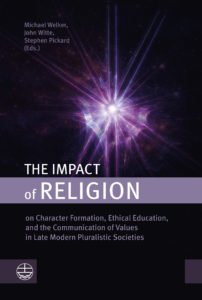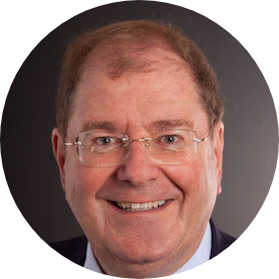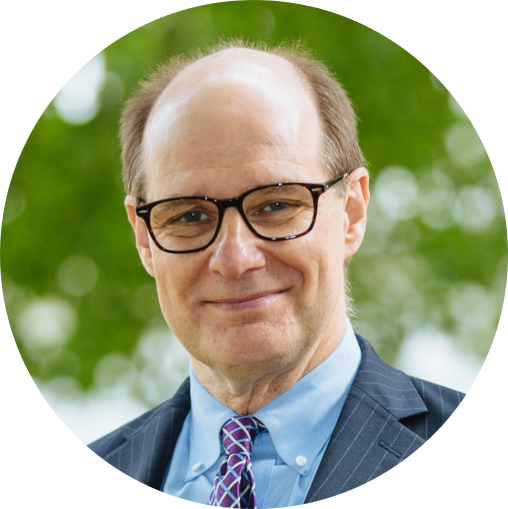
“Character Formation, Ethical Education, and the Communication of Values in Late Modern Pluralistic Societies” by
Michael Welker and John Witte, Jr.
Five hundred years ago, Protestant reformer Martin Luther argued that “three estates” (drei Stände) lie at the foundation of a just and orderly society — marital families, religious communities, and political authorities. Parents in the home; pastors in the church; magistrates in the state — these, said Luther, are the three authorities whom God appointed to represent divine justice and mercy in the world, to protect peace and liberty in earthly life. Household, church, and state — these are the three institutional pillars on which to build social systems of education and schooling, charity and social welfare, economy and architecture, art and publication. Family, faith, and freedom — these are the three things that people will die for.
In the half millennium since Luther, historians have uncovered various classical and Christian antecedents to these early Protestant views. And numerous later theorists have propounded all manner of variations and applications of this three-estates theory, many increasingly abstracted from Luther’s overtly Christian worldview. Early modern covenant theologians, both Christian and Jewish, described the marital, confessional, and political covenants that God calls human beings to form, each directed to interrelated personal and public ends. Social-contract theorists differentiated the three contracts that humans enter as they move from the state of nature to an organized society protective of their natural rights — the marital contract of husband and wife; the government contract of rulers and citizens; and, for some, the religious contracts of preachers and parishioners. Early anthropologists posited three stages of development of civilization — from family-based tribes and clans, to priest-run theocracies, to fully organized states that embraced all three institutions. Sociologists distinguished three main forms of authority in an organized community — “traditional” authority that begins in the home, “charismatic” authority that is exemplified in the church, and “legal” authority that is rooted in the state. Legal historians outlined three stages of development of legal norms — from the habits and rules of the family, to the customs and canons of religion, to the statutes and codes of the state.

Already a century ago, however, scholars in different fields began to flatten out this hierarchical theory of social institutions and to emphasize the foundational role of other social institutions alongside the family, church, and state in shaping private and public life and character. Sociologists like Max Weber and Talcott Parsons emphasized the shaping powers of “technical rationality” exemplified especially in new industry, scientific education, and market economies. Legal scholars like Otto von Gierke and F.W. Maitland emphasized the critical roles of nonstate legal associations (Genossenschaften) in maintaining a just social, political, and legal order historically and today. Catholic subsidiarity theories of Popes Leo XIII and Pius XI emphasized the essential task of mediating social units between the individual and the state to cater the full range of needs, interests, rights, and duties of individuals. Protestant theories of sphere sovereignty, inspired by Abraham Kuyper, argued that not only churches, states, and families but also the social spheres of art, labor, education, economics, agriculture, recreation, and more should enjoy a level of independence from others, especially an overreaching church or state. Various theories of social or structural pluralism, civil society, voluntary associations, the independent sector, multiculturalism, multinormativity, and other such labels have now come to the fore in the ensuing decades — both liberal and conservative, religious and secular, and featuring all manner of methods and logics.
Pluralism of all sorts is now a commonplace of late modern societies. At minimum, this means a multitude of free and equal individuals and a multitude of groups and institutions, each with very different political, moral, religious, and professional interests and orientations. It includes the sundry associations, interest groups, parties, lobbies, and social movements that often rapidly flourish and fade around a common cause, especially when aided by modern technology and various social media. Some see in this texture of plurality an enormous potential for colorful and creative development and a robust expression of human and cultural freedom. Others see a chaotic individualism and radical relativism, which endangers normative education, moral character formation, and effective cultivation of enduring values or virtues.
Pluralism viewed as vague plurality, however, focuses on only one aspect of late modern societies — the equality of individuals, and their almost unlimited freedom to participate peaceably at any time as a respected voice in the moral reasoning and civil interactions of a society. But this view does not adequately recognize that, beneath the shifting cacophony of social forms and norms that constitute modernity, pluralistic societies have heavy normative codes that shape their individual and collective values and morals, preferences and prejudices.
The sources of much of this normative coding and moral education in late modern pluralistic societies are the deep and powerful social systems that are the pillars of every advanced culture. The most powerful and pervasive of these are the social systems of law, religion, politics, science/academy, market, media, family, education, medicine, and national defense. The actual empirical forms of each of these powerful social systems can and do vary greatly, even in the relatively homogeneous societies of the late modern West. But these deeper social systems in one form or another are structurally essential and often normatively decisive in individual and communal lives.
The sources of much of this normative coding and moral education in late modern pluralistic societies are the deep and powerful social systems that are the pillars of every advanced culture.
Every advanced society has a comprehensive legal system of justice and order, religious systems of ritual and doctrine, a family system of procreation and love, an economic system of trade and value, a media system of communication and dissemination of news and information, and an educational system of preservation, application, and creation of knowledge and scientific advance. Many advanced societies also have massive systems of science, technology, health care, and national defense with vast influence over and through all of these other social systems. These pervasive social systems lie at the foundation of modern advanced societies, and they anchor the vast pluralities of associations and social interactions that might happen to exist at any given time.
Each of these social systems has internal value systems, institutionalized rationalities, and normative expectations that together help to shape each individual’s morality and character. Each of these social spheres, moreover, has its own professionals and experts who shape and implement its internal structures and processes. The normative network created by these social spheres is often harder to grasp today, since late modern pluralistic societies usually do not bring these different value systems to light under the dominance of just one organization, institution, and power. And this normative network has also become more shifting and fragile, especially since traditional social systems like religion and the family have eroded in their durability and power, and other social systems like science, the market, healthcare, defense, and the media have become more powerful.
The New Character Formation Project and Publications
The two of us have joined forces with each other and with several other leading scholars, including William Schweiker (University of Chicago), Jürgen von Hagen (Bonn), Stephen Pickard (Canberra), and Piet Naude (Stellenbosch), to lead a major international research project on “Character Formation and Moral Education in Late Modern Pluralistic Societies.” The aim of the project is to identify the realities and potentials of these core social systems to provide moral orientation and character formation in our day. What can and should these social spheres, separately and together, do in shaping the moral character of late modern individuals who, by nature, culture, and constitutional norms, are free and equal in dignity and rights? What are and should be the core educational functions and moral responsibilities of each of these social spheres? How can we better understand and better influence the complex interactions among individualism, the normative binding powers of these social systems, and the creativity of civil groups and institutions? How can we map and measure the different hierarchies of values that govern each of these social systems, and that are also interwoven and interconnected in various ways in shaping late modern understandings of the common good? How do we negotiate the boundaries and conflicts between and among these social systems when one encroaches on the other, or imposes its values and rationalities on individuals at the cost of the other social spheres or of the common good? What and where are the intrinsic strengths of each social sphere that should be made more overt in character formation, public education, and the shaping of minds and mentalities?

These are some of the guiding questions at work in this project. Our project aims to provide a systematic account of the role of these powerful normative codes operating in the social spheres of law, religion, the family, the market, the media, science and technology, academic research, health care, and military defense in the late modern liberal West. Our focus is on selected examples and case studies drawn from Western Europe, North America, South Africa, and Australia, which together provide just enough diversity to test out broader theories of character formation and moral education. Our scholars are drawn from across the academy, with representative voices from the humanities, social sciences, and natural sciences as well as the professions of theology, law, business, medicine, and more. While most of our scholars come from the Protestant and Catholic worlds, our endeavor is to offer comparative insights that will help scholars from any profession or confession. While our laboratory is principally Western liberal societies, the modern forces of globalization will soon make these issues of moral character formation a concern for every culture and region of the world — given the power of global social media, entertainment, and sports; the pervasiveness of global finance, business, trade, and law; and the perennial global worries over food, health care, environmental degradation, and natural disasters.
The first two volumes have just been published, addressing the respective impacts of the market and of religion on character formation, ethical education, and the communication of values in late modern pluralistic societies. Each volume features a score of original chapters from leading scholars in the United States, Western Europe, South Africa, Australia, and Hong Kong. Included are sterling chapters by CSLR Senior Fellows, Michael Broyde, Samuel Gregg, and Frank Lechner as well as by familiar law and religion scholars like Peter Carnley (Anglican Primate, Australia), Jennifer Herdt (Yale), Friederike Nüssel (Heidelberg), and Martyn Percy (Oxford). Slated for publication next spring are two more volumes on the respective impacts of law and of academic research. Forthcoming volumes will study the respective impacts of the family, education, the media, the military, and health care systems. A final integrative monograph will distill the main findings of these volumes, and outline some constructive responses for late modern pluralistic societies. ♦

Michael Welker, Director, Forschungszentrum Internationale und Interdisziplinäre Theologie (FIIT), University of Heidelberg.

John Witte, Jr., Director, Center for the Study of Law and Religion, Emory University.
Recommended Citation
Welker, Michael and John Witte, Jr. “Character Formation, Ethical Education, and the Communication of Values in Late Modern Pluralistic Societies.” Canopy Forum, September 10, 2020. https://canopyforum.org/2020/09/10/character-formation-ethical-education-and-the-communication-of-values-in-late-modern-pluralistic-societies/

